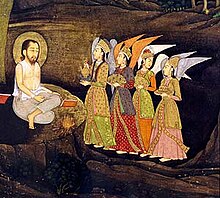Ibrahim Bin Adham
|
Ibrahim ibn Adham (إبراهيم بن أدهم) |
|
|---|---|

A miniature depicting Sultan Ibrahim ibn Adham of Balkh visited by angels, 1760-70.
|
|
| Mystic | |
| Born | c. 718 Balkh |
| Died | c. 782 |
| Venerated in | Islam |
| Major shrine | Sultan Ibrahim Ibn Adham Mosque, West Bank, Jerusalem |
Ibrahim ibn Adham also called Ibrahim Balkhi (إبراهيم بن أدهم); c. 718 – c. 782 / AH c. 100 – c. 165 is one of the most prominent of the early ascetic Sufi saints.
The story of his conversion is one of the most celebrated in Sufi legend, as that of a prince renouncing his throne and choosing asceticism closely echoing the legend of Gautama Buddha. Sufi tradition ascribes to Ibrahim countless acts of righteousness, and his humble lifestyle, which contrasted sharply with his early life as the king of Balkh (itself an earlier centre of Buddhism). As recounted by Abu Nu'aym, Ibrahim emphasised the importance of stillness and meditation for asceticism. Rumi extensively described the legend of Ibrahim in his Masnavi. The most famous of Ibrahim's students is Shaqiq al-Balkhi (d. 810).
According to Muslim tradition, Ibrahim's family was from Kufa, and had shifted, and he was born in Balkh (modern day Afghanistan). While some writers traced his lineage back to 'Abdullah, the brother of Ja'far al-Sadiq, and son of Muhammad al-Baqir, the grandson of Husayn ibn Ali, the most famous family tree of his Sufi ancestors, most authors trace it to Umar bin Khattab.
Accounts of Ibrahim's life are recorded by medieval authors such as Ibn Asakir and Bukhari.
Ibrahim was born into the Arab community of Balkh as the king of the area in around 730 CE, but he abandoned the throne to become an ascetic. He received a warning from God, through Khidr who appeared to him twice, and, abdicated his throne to take up the ascetic life in Syria. Having migrated in around 750 CE, he chose to live the rest of his life in a semi-nomadic lifestyle, often travelling as far south as Gaza. Ibrahim abhorred begging and worked tirelessly for his livelihood, often grinding corn or tending orchards. In addition, he is also said to have engaged in military operations on the border with Byzantium, and his untimely death is supposed to have occurred on one of his naval expeditions.
...
Wikipedia
